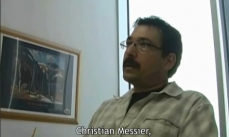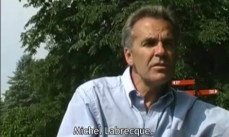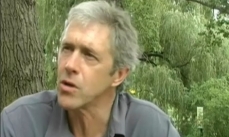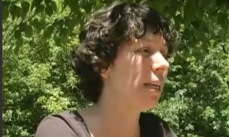Transcription of video clip Future relationships: tomorrowâs Earth
(The video shows interviews with four Quebec scientists on the future of forests.)

© Jardin botanique de Montréal
Christian Messier, director of the Centre for Forestry Research (CFR)
(Christian Messier) I think that with all the changes that are inevitable, what we see is like two trains in motion, that we try to slow or even stop, but that we won't stop.
The first train is climate change.
I think we will make lots of efforts in the future, that we will improve⦠But even with our best efforts, many ecosystems will be greatly disrupted.
The other train, obviously, is population.
So those two trains will impose a great burden on environment.
At the same time, we are more and more sensitized about our environment.
We know better how to, maybe, manage our ecosystems in order to minimize impacts.
So, positive and negative. I think we're capable of improving things, but that we will continue to lose a certain quantity of natural environments.
We lost since the start of, I would say, of the human expansion, we lost 50% of the world's forests.
We had about 8 billion hectares of forests, we have 4 billion now, and we will probably lose 1 or 2 more billion more.
So, that's inevitable.
But once we've understood this, maybe we will try to better manage what we have left, and maybe even slowly restore it.
Mix of the two, then. Realism, maybe.

© Jardin botanique de Montréal
Michel Labrecque, conservator of the Jardin botanique de Montréal
(Michel Labrecque) Sometimes, I'm quite pessimistic, and its difficult not to be when you see the deterioration of the environment, on a planetary scale.
Forests that are cut down, seas that get polluted, species that go extinct, global warming.
I think the picture is very bleak.
I try not to fall into that pessimism, and to say âWell there still are elements of solution, there still are good things here and thereâ, but there aren't very much of those. They're like a drop of water in the ocean.
I find that very worrying.
I think that overpopulation is THE element that generates all other problems.
The fact that we're too many for this planet, too many to nourish, too many to invade the spaces, too many to compete with the natural inhabitants for other living species⦠too many to produce waste of all kinds, that pollute seas, that pollute the air, the ground, etcâ¦
We don't exploit the forests in a durable fashion, we can't say that. When we exploit the forests, we destroy the forests. We don't exploit the mines in a durable fashion, we don't exploit the seas in a durable fashion.
It's a way of saying things, but in reality we destroy, we take.
It's quite difficult to exploit, to put side by side the terms exploitation and sustainable development. They are contradictions.
That's why I am quite pessimistic.
I still hope nonetheless, I try to keep hope that⦠that man will be bright enough to react and to continue to react before it's too late. But I don't knowâ¦
Where I take my stand is that we must not give up.
We must convince, we must sensitize, we must workâ¦

© Jardin botanique de Montréal
Alain Cogliastro, botanist at the Jardin botanique de Montréal
(Alain Cogliastro) I am usually optimistic. As soon as pessimism arrives, it's like there's solutions that come to mind.
I think that humanity will work with solutions.
It will be a completely changed forest, everywhere on the planet, that is obvious.
I think that we will be more and more interventionists about forests, that the forests will be transformed, will, I think, not be identical to what they were, but probably represent key elements of what a forest is.
We will try to guarantee a certain diversity, a certain stratification. But we will have interests in those forests, to have specific species more than othersâ¦
But well, they will be transformed a lot.
I think that the elements, the vital contribution of those forests on humanity will maintain itself at a levelâ¦
I was going to say minimal, but sufficient.
It will always be a battle, I think, but I think we will work to maintain it, or else we are going to suffer a lot.

© Jardin botanique de Montréal
Isabelle Aubin, scientific researcher at the Canadian Forest Service, Natural Resources Canada
(Isabelle Aubin) I think we must ask ourselves some very philosophical questions, I would say, about the future of forests.
Right now, we are in the process of changing profoundly the forest.
I find that a good example is Malaysia, where the forest cover is diminishing very very rapidly.
And often, the argumentation given by the government is to say that in reality the forest cover is not reducing in reality, because they are transforming primary forests.
So virgin forests, we could say, at the very least forests with a very rich biodiversity, in palm oil plantation, so palms that produce palm oil.
So, for them, that's a forest cover.
It's very different of the original forest that was there originally.
So we must ask ourselves questions about the quality of the forests, really develop forest quality indicators, and make social choices.
Ask ourselves if we want, what priorities we want to give to conservation.
And also understand that, when we are talking about complex ecosystems like forests, there isn't one solution, there are many solutions.
It's often the problem, we often try to find a miracle solution.
But it's risky, it's risky because the forest needs this complexity of use, needs to stay complex, and if we choose only one solution, well we will homogenize it.
If we go on at that rhythm, the natural forest will not exist anymore.
So, we will have to ask ourselves, we will have to ask: What do we want to preserve, and, really, what does being a âforestâ mean to us?
Back to video clip




